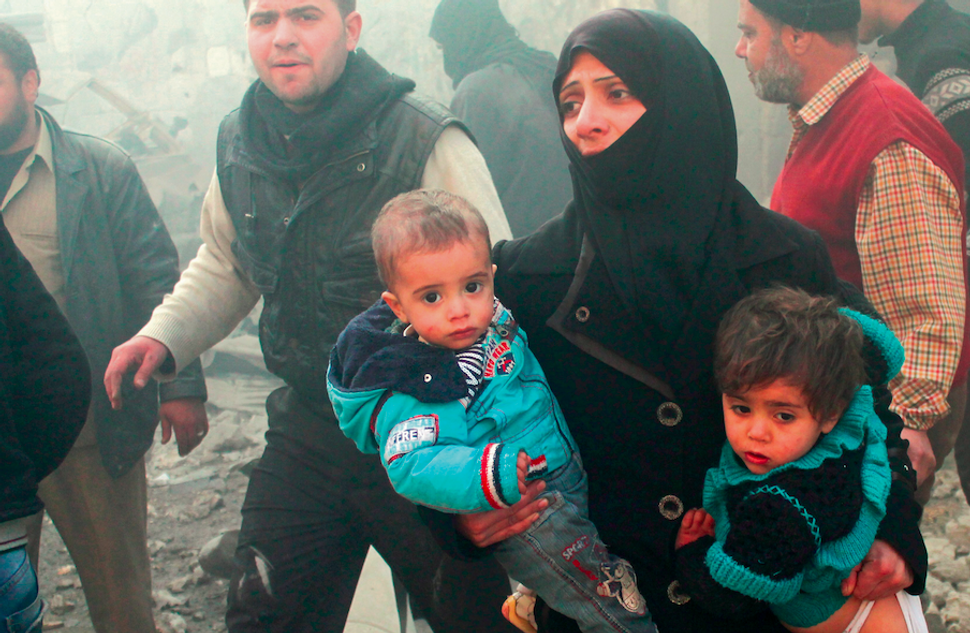Solve the Refugee Crisis at Its Source — in Syria

Image by Getty Images
Now, the crisis cannot be ignored. Hundreds of thousands of refugees are pouring out of strife-torn countries, risking their lives in desperate sea crossings and overland treks, crowding train stations and jamming borders, for the uncertain promise of rescue. How could we not cry out, as human beings, as Americans, as Jews? Every nation’s true character is on display. We are frustrated by America’s paltry acceptance, and appalled by the cruel xenophobia gripping much of Central and Eastern Europe and the Persian Gulf. How we treat the stranger, we are taught, says everything about who we are.
At this moment there are 19 million people in the world who are refugees, and they are fleeing war, lower-level violence, persecution and poverty in Asia, Africa, Central America and the Middle East. Many are driven by local crises that are largely unconnected and have little or nothing to do with American interests.
But Syria is different. Syria is a hell on earth, and while the United States didn’t cause its tragic disintegration, we, along with like-minded nations, could have taken stronger steps militarily and diplomatically to stop the carnage — steps that many American Jews supported in 2013. They may not have worked. But it’s hard to imagine a more awful scenario than the one unfolding before us now.
And it’s hard not to draw a direct line between that failure two years ago and the distressing scenes of Syrians literally washing up on Europe’s shores today.
Between the ruthless destructiveness of Bashar al-Assad’s regime and the murder, torture and sex slavery committed by the Islamic State, it’s no wonder Syrians are fleeing. More than 200,000 have died since the civil war began in 2011; 11 million are displaced internally or have fled the country.
From the start of the civil war, the Obama administration has not known what to do. Mindful of the public’s wariness to enter yet another Middle East conflict, the president vacillated from advocating regime change to dialing back U.S. responsibility, then to declaring “red lines” without having assembled a workable coalition, either at home or abroad, to back up that threat.
Then came the poisonous gas attack outside Damascus on August 21, 2013, killing more than 1,400 Syrians and introducing a dangerous new feature in the fighting — a brutal and indiscriminate chemical weapon, the use of which defied international convention and all human decency. The evidence pointed to Assad. He crossed the red line.
The United Nations proved itself to be ineffectual and irrelevant — sadly enough, true again today. But that was not going to deter the White House. With a new resolve, the president said that he was prepared to order a military strike against Syria.
Except then he strode into the Rose Garden and announced that he would ask for congressional authorization even though he didn’t need it, because, as he put it, “I know that the country will be stronger if we take this course, and our actions will be even more effective.”
Obama may have been right to include Congress and insist that its members share responsibility for a fateful decision, but the move effectively dissipated momentum and subjected what should have been a strong, principled action to a slow, partisan death.
Would crippling Assad in 2013 have changed the course of the civil war, deterred the growth of the Islamic State and avoided the catastrophe that we see today? Really, no one knows. But we do know that the administration’s incoherent policy has enabled the destruction to continue.
The decision last year to spend $500 million to train and arm rebels who were vetted and told to fight the Islamic State — but not Assad’s government — has been an outright failure. The goal was to train 5,400 fighters in the first year, but military officials said that only 100 to 200 were actually trained. Then 54 of those graduates were attacked by an Al Qaeda affiliate. Finally, a commander told a congressional hearing September 16 that only four or five American-trained fighters are actually fighting in Syria.
Two years ago, when debate over the use of force in Syria was dominating Congress and stirring the public, American Jewish leaders came to an unusually strong consensus behind the president. Many Republicans and Democrats, hawks and progressives, rabbis and activists agreed that the use of chemical weapons was a serious crime against humanity. That sentiment presented a welcome antidote to the isolationism expressed in U.S. public opinion polls — an isolationism that surely propelled the congressional reluctance to get involved.
But what of that sentiment today? In 2013, the gruesome use of gas against innocent civilians had undeniable echoes of the Holocaust. In 2015, the images of struggling refugees turned away by callous countries have undeniable echoes of the Jewish experience in World War II and of the myriad times in our long history when persecuted Jews were denied safe haven.
It’s gratifying to see the American Jewish community rally around a push to ease this crisis and welcome more refugees to our country. But the real civic challenge is to stem this desperate flow of people at its source. The time for swift military action is long gone, but there ought to be renewed efforts for some sort of political solution to the Syrian conflict before its blood and heartbreak seep even further around the globe.
Just imagine if all the energy and just some of the money poured into debating the nuclear deal with Iran were now directed toward finding a way to end the carnage in Syria. We don’t discount the limits of American power and influence, but they haven’t yet been tested here. We Jews ought to demand that they are.



















